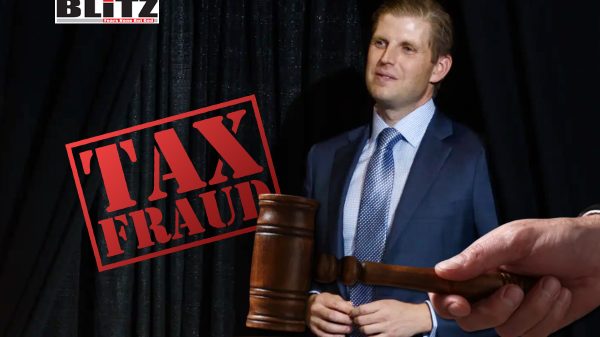Tampa real estate mogul sentenced to three years in federal prison for massive tax fraud
- Update Time : Friday, August 15, 2025

A former Tampa real estate investment executive has been sentenced to three years in federal prison for a brazen tax fraud scheme that prosecutors say concealed nearly $30 million in income. The conviction marks the first criminal penalty tied to a wider web of alleged financial misconduct surrounding EquiAlt LLC, a company once touted as a thriving investment firm before collapsing amid fraud allegations.
Brian Davison, co-founder and former chief executive officer of EquiAlt, pleaded guilty to three counts of tax fraud on March 24. On August 12, the US Attorney’s Office for the Middle District of Florida announced that a federal judge had sentenced him to prison and ordered him to pay $6,293,592 in restitution to the Internal Revenue Service. The ruling comes after years of federal investigations into both Davison’s personal finances and the inner workings of EquiAlt, which the Securities and Exchange Commission (SEC) has accused of operating as a massive Ponzi scheme.
Just a few years ago, Davison was a prominent figure in Florida’s real estate investment scene. EquiAlt, the firm he co-founded, presented itself as a safe and profitable avenue for investors seeking steady returns from real estate holdings. In reality, according to the SEC, it was an elaborate scam that fleeced at least 1,100 investors out of a staggering $170 million through fraudulent and unregistered securities offerings.
The SEC’s civil complaint, filed in February 2020, accused Davison and former EquiAlt Managing Director Barry Rybicki of using investor funds to enrich themselves, fund lavish lifestyles, and pay off earlier investors-a classic Ponzi scheme hallmark. Rybicki has not faced federal criminal charges, though the SEC’s civil case against him remains active.
Following the SEC’s intervention, EquiAlt was placed into judicial receivership and its assets liquidated. Investors were left scrambling to recover whatever they could from the wreckage, while federal investigators dug deeper into the personal finances of the company’s leadership.
The criminal case against Davison was narrower in scope than the SEC’s sweeping Ponzi scheme allegations, but no less serious in the eyes of the court. According to the plea agreement, Davison filed multiple personal income tax returns between October 2018 and December 2020 that grossly underreported his earnings from EquiAlt and other business entities.
In total, prosecutors say Davison failed to disclose at least $29.7 million in income. This intentional deception resulted in a tax loss to the US government of more than $6.29 million. The IRS Criminal Investigation unit, working alongside the FBI’s Tampa field office, uncovered the scheme during their probe into EquiAlt’s finances.
Assistant US Attorney Adam J. Duso, who prosecuted the case, emphasized that Davison’s conduct was not a matter of oversight or accounting error. “This was a deliberate and sustained effort to evade the taxes owed on millions of dollars in income,” Duso said. “Tax fraud of this magnitude undermines the integrity of our financial system and shifts the burden to law-abiding taxpayers.”
Court documents reveal that Davison’s tax fraud took place while the SEC investigation into EquiAlt was already underway. Despite being under intense regulatory scrutiny, Davison allegedly continued to conceal income from federal authorities. This pattern of deception, prosecutors argued, demonstrated both his willingness to flout the law and his belief that he could avoid consequences.
The sentencing judge appeared to agree, imposing the maximum penalty allowed under the plea deal-three years in federal prison-alongside the multimillion-dollar restitution order.
While Davison’s prison sentence provides some measure of accountability, it is unlikely to end the legal fallout from EquiAlt’s collapse. The SEC’s civil enforcement action against both Davison and Rybicki is still active, and court-appointed receivers are continuing efforts to recover funds for defrauded investors. In Ponzi scheme cases, such recovery is typically a lengthy process, with investors often receiving only a fraction of their original investments.
For the 1,100 victims of EquiAlt’s alleged scam, the sentence may feel like a hollow victory. Many invested life savings, retirement funds, or inheritance money into what they believed was a legitimate, asset-backed investment strategy. Instead, they were left with empty promises and financial devastation.
Financial regulators and prosecutors have used the EquiAlt case to underscore the importance of investor due diligence and skepticism toward “too good to be true” opportunities. The SEC’s complaint alleged that EquiAlt’s marketing promised annual returns of 8–10% with minimal risk—an attractive pitch that should have raised red flags in an unpredictable real estate market.
The IRS, for its part, has highlighted the case as a cautionary tale for business executives who may be tempted to hide income. “Failing to pay your fair share of taxes is a crime, regardless of your wealth or position,” an IRS Criminal Investigation spokesperson said. “We will continue to pursue those who believe the rules do not apply to them.”
Davison will serve his sentence in a federal correctional facility, after which he will be subject to supervised release. The restitution order ensures that he remains financially liable for the $6.3 million in unpaid taxes, regardless of his prison term.
Meanwhile, the broader investigation into EquiAlt’s operations could yield additional legal actions, particularly if new evidence emerges or if federal prosecutors decide to expand criminal charges to include the underlying Ponzi scheme allegations.
For now, the sentencing of Brian Davison closes one chapter in a saga that has exposed deep flaws in both the real estate investment sector and the regulatory oversight intended to protect investors. It is a stark reminder that in the world of high finance, appearances can be deceiving-and when the truth catches up, the fall can be swift and unforgiving.
Please follow Blitz on Google News Channel










